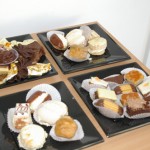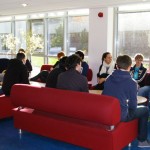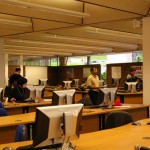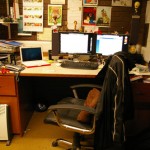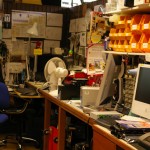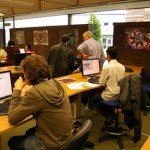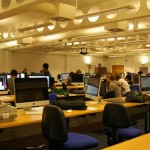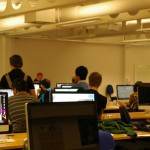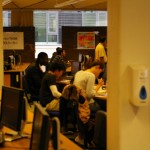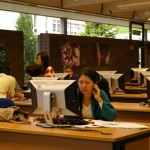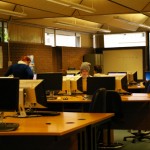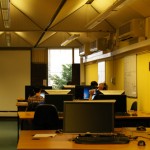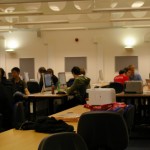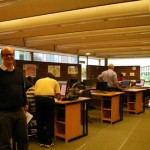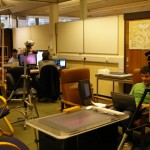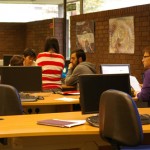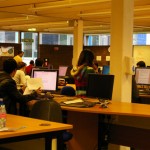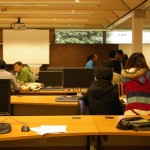An electronic voting system, developed by Ross and Stuart, was used to conduct the election for the new Rector. Full results are available in the University News.
Month: October 2011
Personalisation In Mobile Applications
Fehmi and Tristan’s paper, Context-based Personalised Settings for Mobile Location Sharing, featured in the PeMA 2011: Personalization in Mobile Applications Workshop.
The 5th ACM International Conference on Recommender Systems, took place in Chicago, Illinois from the 23rd until the 27th October.
Continued Success For MSc Students
Work carried out by Mary Steele, Titilayo Adegbamiye (both supervised by Gordon) and Shangyi Jiang (supervised by Ishbel), in fulfilment of their MSc, has continued success.
Mary’s dissertation focus, promoting public awareness of the links between lifestyle and cancer A controlled study of the usability of health information leaflets, has been accepted for publication in the International Journal of Medical Informatics.
Titilayo’s disssertation focus, evaluating the Usability of Home Blood Pressure Monitors, featured in Workshop Proceedings at INTERACT 2011. Final proceedings are now available.
Charlie’s (Shangyi Jiang) focus on virtual worlds contributed to Ishbel’s Paper, A taxonomy of virtual worlds usage in education, recently accepted by the British Journal of Educational Technology.
Information meetings
The School holds monthly information meetings for staff.
Undergraduate Visiting Day
Another successful and well-attended Wednesday visiting day took place yesterday. Prospective undergraduates had the opportunity to meet staff, current students, eat cake and view the School facilities.
The familiar but extremely useful events are organised by Tristan, Adam and Saleem with help from volunteer students.
Isabel, Jesal, Anastasia and Thomas were the student volunteers undertaking yesterday’s tour and answering general questions.
Thursday Afternoon In Computer Science
Life in the Comp Sci Labs
The MSc lab in the John Honey building was busy with IT students holding initial group work meetings, for their next assignment. The advanced network students were networking, in a virtual sense, using WI-FI island.
Yemliha and Umer looked occupied in the HCI lab. A number of 3rd and 4th year students were busy with Project work in The Honours lab. Alas Davie and Jim were busy elsewhere.
Attendance in the 1st and 2nd year sub-honours lab, in the Jack Cole building, could be indicative of an imminent deadline. Modelling of various persuasions appeared to be the focus.
2011 Frontiers in Education Conference
Colin and Alan’s paper, The Third Dimension in Open Learning will feature in the T2E Technical Session Engineering Frontiers of Instructional Technologies, today.
The Frontiers in Education Conference taking place in South Dakota has become the premiere conference for innovative curricula made possible by three sponsoring professional societies. ASEE Educational Research and Methods Division, IEEE Education Society and IEEE Computer Society.
Sword Ciboodle presentation
Sword Ciboodle will be visiting the University of St. Andrews on Tuesday 1st November between 1pm and 2pm. Come and join us in Jack Cole 1.33A to gain an insight into the Company and for information about graduate opportunities within the Research & Development and Professional Services teams. Opportunities exist for summer placements and full time roles following graduation. You will also be able to meet some of our most recent graduates to understand their experiences of working with the Company. Lunch will be provided.
Sword Ciboodle, with over 300 staff based in five offices around the world (Chicago, Sydney, Jakarta, Johannesburg and Glasgow), has its headquarters in Renfrewshire, near Glasgow in the India of Inchinnan building, the only commercially used Grade-A listed building in Scotland. Apart from the impressive surroundings, Sword Ciboodle employees also benefit from a competitive salary, excellent benefits and the opportunity to work with some of the best Software Engineers in the industry.
Further information can be found at www.sword-ciboodle.com.
Please register your interest with Jenna at Jenna.Currie@sword-ciboodle.com. Please do not hesitate to get in touch if you have any questions.
Event details
- When: 1st November 2011 13:00 - 14:00
- Where: Cole 1.33a
Beacon Series 2011-2012
A series of talks by Post-doctoral researchers from a number of academic schools across the University begin on the 20th October. The first lecture by Edwin Brady from Computer Science, will be introduced by Al. Chris Jefferson will be giving a talk in early March.
The talks will take place on Thursday evenings from 6 pm to 7 pm, starting on 20th October in Lecture Theatre C in Physics.
More information about the Beacon Series and the Open Association can be located on their website.
Augmentative and Alternative Communication across the Lifespan of Individuals with Complex Communication Needs
Speaker: Annalu Waller, University of Dundee
Abstract:
Augmentative and alternative communication (AAC) attempts to augment natural speech, or to provide alternative ways to communicate for people with limited or no speech. Technology has played an increasing role in AAC. At the most simplest level, people with complex communication needs (CCN) can cause a prestored message to be spoken by activating a single switch. At the most sophisticated level, literate users can generate novel text. Although some individuals with CCN become effective communicators, most do not – they tend to be passive communicators, responding mainly to questions or prompts at a one or two word level. Conversational skills such as initiation, elaboration and story telling are seldom observed.
One reason for the reduced levels of communicative ability is that AAC technology provides the user with a purely physical link to speech output. The user is required to have sufficient language abilities and physical stamina to translate what they want to say into the code sequence of operations needed to produce the desired output. Instead of placing all the cognitive load on the user, AAC devices can be designed to support the cognitive and language needs of individuals with CCN, taking into account the need to scaffold communication as children develop into adulthood. A range of research projects, including systems to support personal narrative and language play, will be used to illustrate the application of Human Computer Interaction (HCI) and Natural Language Generation (NLG) in the design and implementation of electronic AAC devices.
About Annalu:
Dr Annalu Waller is a Senior Lecturer in the School of Computing at the University of Dundee. She has worked in the field of Augmentative and Alternate Communication (AAC) since 1985, designing communication systems for and with nonspeaking individuals. She established the first AAC assessment and training centre in South Africa in 1987 before coming to Dundee in 1989. Her PhD developed narrative technology support for adults with acquired dysphasia following stroke. Her primary research areas are human computer interaction, natural language generation, personal narrative and assistive technology. In particular, she focuses on empowering end users, including disabled adults and children, by involving them in the design and use of technology. She manages a number of interdisciplinary research projects with industry and practitioners from rehabilitation engineering, special education, speech and language therapy, nursing and dentistry. She is on the editorial boards of several academic journals and sits on the boards of a number of national and international organisations representing disabled people.
Event details
- When: 11th October 2011 13:00 - 14:00
- Where: Cole 1.33a
- Format: Seminar


